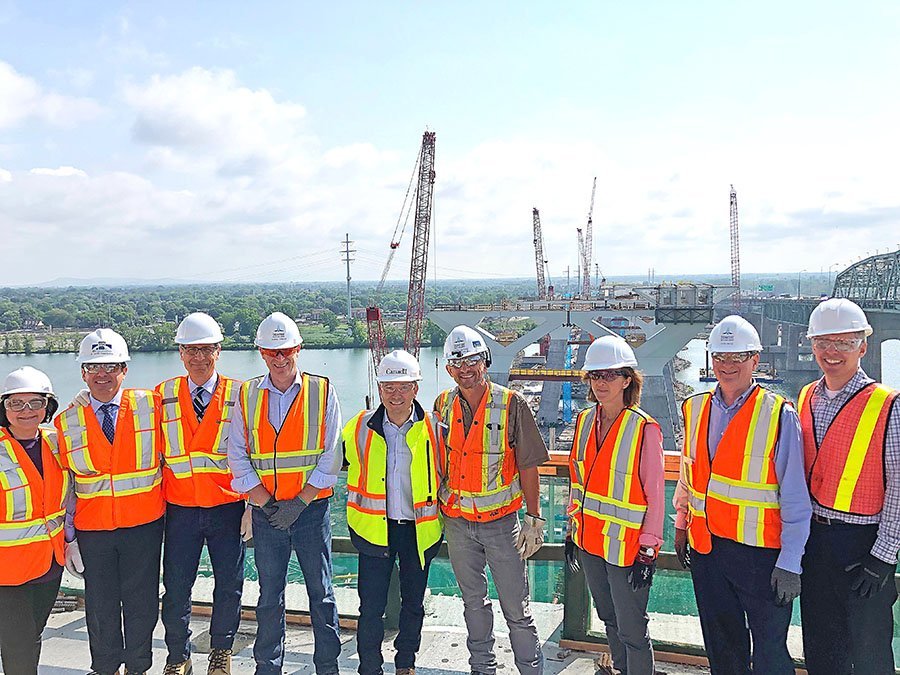
Federal Infrastructure and Communities Minister François-Philippe Champagne had mud on his boots when he arrived for an interview with Newsfirst Multimedia at the federal cabinet’s Montreal offices in Old Montreal in early August.
But there was good reason. He had just completed an inspection at the site of the massive new span currently being built across the St. Lawrence River to replace the aging Champlain Bridge.
It was a fitting introduction to a federally-elected official who seems to prefer a direct and hands-on approach in all his dealings. The 48-year-old Champagne, who is the Member of Parliament for Saint-Maurice–Champlain in Quebec’s Mauricie region, is on fairly familiar ground when it comes to bridges.

Knows infrastructure
According to a CV of Champagne’s credentials and experience over the past two decades, he served on the board of Incheon Bridge Corp., which operates a cable-stayed span and roadway that are a major piece of road transportation infrastructure in South Korea.
A lawyer and international trade specialist, Champagne was also, among other things, a senior legal counsel for the multinational industrial equipment manufacturer ABB Group, before being appointed Minister of International Trade last year. He received his current portfolio from Prime Minister Justin Trudeau on July 18.
“Anyone who’s coming into politics is bringing in their background in terms of professional qualifications and experience,” said Champagne. “I did have a chance as a lawyer, not as an engineer, to work in a number of engineering firms in my previous roles in the private sector. So I know big infrastructure projects and that’s why I’m very excited in this role.”
New Champlain Bridge
Regarding the new Champlain Bridge, Canada’s auditor-general issued a statement last May, saying there was uncertainty as to whether the bridge will be finished by a projected completion date of Dec. 21 this year. All the same, more than three-quarters of the $4.2 billion project is now finished.
“What is known is that the work is well in advance,” Champagne said when asked about the progress of the project. “But the objective and what I will be doing in the coming weeks is sitting down, as you would expect, with the experts, because this is a very complex project. So I want to really sit down with the experts to really understand what are the opportunities and what still needs to be done.”

Making sure it’s done right
In his report, the auditor-general did not clearly confirm an earlier claim made by the federal government and the consortium building the new bridge that it will last 125 years. Nonetheless, Champagne emphasized the importance of getting the project done properly, although delays might also have an economic impact.
“You know when you look at an infrastructure that complex and that will go well over a century, I think the people who are reading your paper would want to make sure that we get it right,” he said.
“I think the bottom line is to make sure that we get it right, because this is an infrastructure that I want every Montrealer, Quebecer and Canadian to be extremely proud of what we have achieved together. There are more than 1,500 workers on the site and every time I have the opportunity, I go around to thank them personally for their work.”
A Jean Chrétien admirer
According to a profile in the Toronto Globe & Mail in 2009 (six years before Champagne first went to Ottawa), he was inspired to get into politics by another high-profile native of Shawinigan and Liberal – former Prime Minister Jean Chrétien. Perhaps for that reason, Champagne has a certain directness about him that was also a notable quality of the ex-PM and MP Saint-Maurice.
“When you come from Shawinigan and you’re a kid and you have a towering figure like Jean Chrétien, it’s obvious,” he said, confirming his admiration. “I always wanted to serve. I was involved quite early in my life in different organizations. And that’s why I left the private sector. I spent a good part of my career in firms around the world. But I always wanted to serve the people from Shawinigan.”
Impact of carbon tax changes
In early August, the Liberal government in Ottawa announced that it had decided to scale back carbon pricing guidelines in preparation for next year when a price range is supposed to be applied on industrial carbon emissions. Some programs offered by Champagne’s ministry involve the creation of environmentally-sustainable and “green” infrastructure.
“We’re going to continue our historic investment in green infrastructure,” he said when asked whether the carbon pricing modifications stand to alter plans at his ministry. “I think Canadians from coast to coast to coast understand that global warming is probably the most challenging issue of all time. And certainly they expect their federal government to be at the forefront leading.
“Certainly from an infrastructure perspective, my mission is to build modern, resilient and green infrastructure,” he added. “I think Canadians expect that. They expect infrastructure that we’re building now and for decades to come to be mindful of the environment, and that’s how we can lead the way.”



